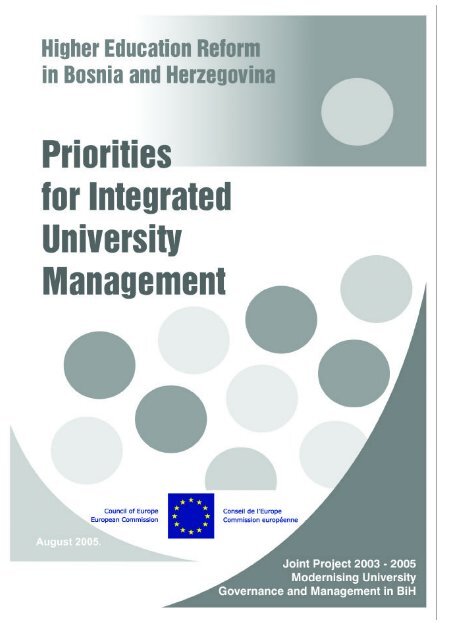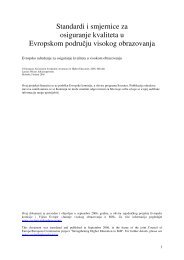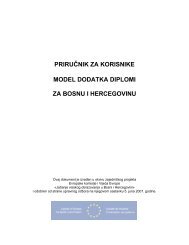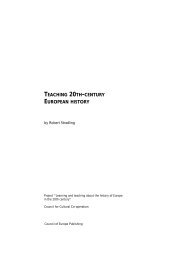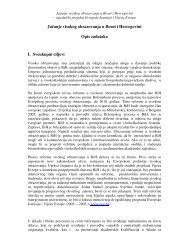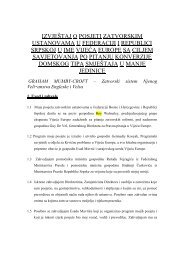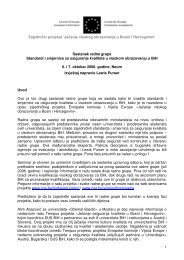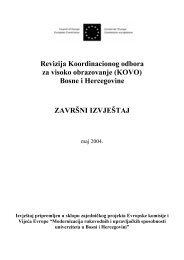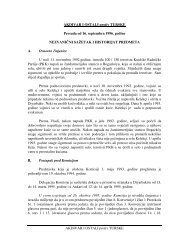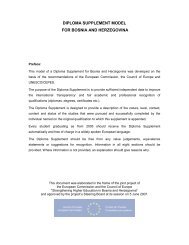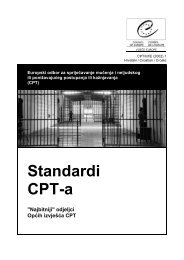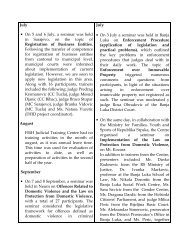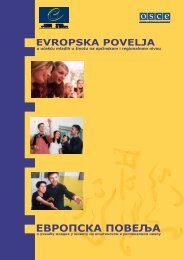ENG mantra.qxp - Council of Europe Office in Bosnia and Herzegovina
ENG mantra.qxp - Council of Europe Office in Bosnia and Herzegovina
ENG mantra.qxp - Council of Europe Office in Bosnia and Herzegovina
You also want an ePaper? Increase the reach of your titles
YUMPU automatically turns print PDFs into web optimized ePapers that Google loves.
Impressum<br />
<strong>Europe</strong>an University Association consultants:<br />
Pr<strong>of</strong>. Dr. Fuada Stankovi}, Pr<strong>of</strong>essor <strong>of</strong> economics at the University <strong>of</strong> Novi Sad,<br />
Serbia <strong>and</strong> Montenegro. Former rector <strong>of</strong> the University <strong>of</strong> Novi Sad<br />
(2001 to 2004).<br />
Pr<strong>of</strong>. Dr. Ivan Ostrovský, Vice-Rector <strong>of</strong> the Comenius University<br />
<strong>in</strong> Bratislava, Slovak Republic.<br />
David Crosier, Senior Advisor <strong>in</strong> the department for policy development,<br />
<strong>Europe</strong>an University Association, Belgium.<br />
<strong>Council</strong> <strong>of</strong> <strong>Europe</strong> project team:<br />
Karen Roberts, Nedim Vrabac<br />
Translation by:<br />
Amira Sadikovi}<br />
Graphic Design:<br />
Alma Hrasnica<br />
Published:<br />
September 2005<br />
Pr<strong>in</strong>ted by:<br />
Arka Press, Sarajevo<br />
Copyright © 2005<br />
<strong>Council</strong> <strong>of</strong> <strong>Europe</strong><br />
<strong>Council</strong> <strong>of</strong> <strong>Europe</strong><br />
Fra Grge Marti}a 2/I,<br />
71000 Sarajevo<br />
<strong>Bosnia</strong> <strong>and</strong> Herzegov<strong>in</strong>a<br />
Tel.: +387 33 264 360<br />
Fax: +387 33 233 937<br />
E-mail: coe.sarajevo@coe.<strong>in</strong>t<br />
<strong>Europe</strong>an Commission<br />
Delegation to <strong>Bosnia</strong> <strong>and</strong> Herzegov<strong>in</strong>a<br />
Dubrova~ka 6, 71000 Sarajevo<br />
<strong>Bosnia</strong> <strong>and</strong> Herzegov<strong>in</strong>a<br />
Tel.: +387 33 666 044<br />
Fax: +387 33 666 037<br />
E-mail: delegation-bih@cec.eu.<strong>in</strong>t<br />
4<br />
This document has been produced with the f<strong>in</strong>ancial assistance <strong>of</strong> the <strong>Europe</strong>an Union.<br />
The views expressed here<strong>in</strong> can <strong>in</strong> no way be taken to reflect the <strong>of</strong>ficial op<strong>in</strong>ion <strong>of</strong> the <strong>Europe</strong>an Union.
5<br />
Table <strong>of</strong> Contents<br />
Foreword <strong>Europe</strong>an Commission 6<br />
Foreword <strong>Council</strong> <strong>of</strong> <strong>Europe</strong> 7<br />
The jo<strong>in</strong>t project <strong>of</strong> the <strong>Europe</strong>an Commission<br />
<strong>and</strong> the <strong>Council</strong> <strong>of</strong> <strong>Europe</strong> "Modernis<strong>in</strong>g Management<br />
<strong>and</strong> Governance Capacities <strong>of</strong> Universities <strong>in</strong> BiH" 8<br />
The Genesis <strong>of</strong> the Recommendations for<br />
Priorities for Integrated University Management 10<br />
1. Curricular Reform 12<br />
2. Human Resources Management 14<br />
3. Student progression, employability <strong>and</strong> career opportunities 16<br />
4. Research 18<br />
5. Internationalisation 20<br />
Recommended Literature 22
Foreword<br />
Ambassador Michael B. Humphreys<br />
Head <strong>of</strong> Delegation <strong>of</strong> the <strong>Europe</strong>an<br />
Commission to <strong>Bosnia</strong> <strong>and</strong> Herzegov<strong>in</strong>a<br />
The jo<strong>in</strong>t project between the <strong>Europe</strong>an Commission <strong>and</strong> the <strong>Council</strong> <strong>of</strong> <strong>Europe</strong> has<br />
laid the foundations for the reform <strong>of</strong> the Higher Education sector <strong>in</strong> <strong>Bosnia</strong> <strong>and</strong><br />
Herzegov<strong>in</strong>a. This project constitutes the first step <strong>in</strong> a long road towards reform <strong>of</strong><br />
higher education <strong>and</strong> <strong>in</strong>deed education as a whole <strong>in</strong> this country.<br />
I am particularly pleased with the sense <strong>of</strong> ownership displayed by many <strong>of</strong> the pr<strong>in</strong>cipal<br />
actors <strong>and</strong> their dedication to reform.<br />
<strong>Bosnia</strong> <strong>and</strong> Herzegov<strong>in</strong>a has committed itself to the Bologna Pr<strong>in</strong>ciples <strong>and</strong> the<br />
Lisbon process but there is a grow<strong>in</strong>g realisation that it has a lot <strong>of</strong> catch<strong>in</strong>g-up to<br />
do <strong>in</strong> terms <strong>of</strong> align<strong>in</strong>g the country with the <strong>Europe</strong>an acquis <strong>and</strong> <strong>of</strong> course prepar<strong>in</strong>g<br />
for eventual membership <strong>of</strong> the <strong>Europe</strong>an Union. A number <strong>of</strong> <strong>in</strong>itiatives have<br />
been taken dur<strong>in</strong>g the lifetime <strong>of</strong> this project to remedy this. Graduates who have<br />
<strong>in</strong>vested time, energy <strong>and</strong> resources to obta<strong>in</strong> their degrees deserve to have their<br />
efforts recognised both at home <strong>and</strong> <strong>in</strong>ternationally.<br />
The <strong>Europe</strong>an Commission will cont<strong>in</strong>ue to accompany this process but the impetus<br />
must come from with<strong>in</strong>.<br />
I congratulate all associated with the project for their dynamism <strong>and</strong> pr<strong>of</strong>essionalism<br />
<strong>and</strong> rema<strong>in</strong> confident that, despite the difficulties ahead, <strong>Bosnia</strong> <strong>and</strong><br />
Herzegov<strong>in</strong>a is on the right track which will lead to a better future for its young people<br />
<strong>and</strong> <strong>in</strong>deed, for the country as a whole.<br />
6
7<br />
Foreword<br />
Gabriele Mazza<br />
<strong>Council</strong> <strong>of</strong> <strong>Europe</strong><br />
Director General <strong>of</strong> School,<br />
Out <strong>of</strong> School <strong>and</strong> Higher Education<br />
Throughout <strong>Europe</strong>, Higher Education is undergo<strong>in</strong>g a far reach<strong>in</strong>g reform <strong>in</strong> the frame<br />
<strong>of</strong> the Bologna Process. In <strong>Bosnia</strong> <strong>and</strong> Herzegov<strong>in</strong>a this challenge is even greater than<br />
elsewhere. This is why the <strong>Europe</strong>an Commission <strong>and</strong> the <strong>Council</strong> <strong>of</strong> <strong>Europe</strong> have jo<strong>in</strong>ed<br />
forces to make this process successful. With<strong>in</strong> the jo<strong>in</strong>t project "Modernis<strong>in</strong>g<br />
Governance <strong>and</strong> Management <strong>of</strong> Universities <strong>in</strong> BiH" we assist Higher Education<br />
Institutions <strong>and</strong> political authorities <strong>in</strong> BiH to develop jo<strong>in</strong>tly practical tools for the implementation<br />
<strong>of</strong> the required reforms.<br />
Possibly the biggest impact <strong>of</strong> this project is that for the first time fora were provided<br />
<strong>in</strong> which all BiH Universities jo<strong>in</strong>tly analyse their problems <strong>and</strong> develop tools <strong>and</strong> perspectives<br />
for their respective <strong>in</strong>stitution's strategic development.<br />
These collected recommendations for management priorities <strong>of</strong> Universities <strong>in</strong> BiH are<br />
such a jo<strong>in</strong>t tool, developed by staff members <strong>and</strong> students from all BiH Universities <strong>in</strong><br />
a series <strong>of</strong> workshops <strong>and</strong> have helped the Universities to enter a constructive discussion<br />
on issues <strong>of</strong> common concern.<br />
I wish to congratulate all those <strong>in</strong>volved <strong>in</strong> this difficult but successful exercise, first <strong>of</strong><br />
all the workshop participants from BiH.<br />
At the same time our gratitude goes to the <strong>in</strong>ternational experts who were assist<strong>in</strong>g<br />
<strong>and</strong> guid<strong>in</strong>g this process: Pr<strong>of</strong>. Dr. Fuada Stankovi}, Pr<strong>of</strong>. Dr. Ivan Ostrovský <strong>and</strong> Mr<br />
David Crosier from the <strong>Europe</strong>an University Association.<br />
I would also like to pay tribute to the <strong>Europe</strong>an Commission, whose generous f<strong>in</strong>ancial<br />
<strong>and</strong> political support has made this project possible. And last but not least, I would like<br />
to record my appreciation <strong>of</strong> the excellent work done by my colleagues <strong>in</strong> the <strong>Council</strong><br />
<strong>of</strong> <strong>Europe</strong> project team, Ms Karen Roberts <strong>and</strong> Mr Nedim Vrabac.<br />
Both the <strong>Council</strong> <strong>of</strong> <strong>Europe</strong> <strong>and</strong> the <strong>Europe</strong>an Commission rema<strong>in</strong> dedicated to assist<strong>in</strong>g<br />
Higher Education reforms <strong>in</strong> BiH. We hope that this work<strong>in</strong>g document will encourage<br />
all <strong>in</strong>dividuals <strong>and</strong> stakeholders <strong>in</strong>volved <strong>in</strong> Higher Education reform <strong>in</strong> BiH to meet<br />
the challenges outl<strong>in</strong>ed <strong>in</strong> the Bologna Process.
The jo<strong>in</strong>t project <strong>of</strong> the <strong>Europe</strong>an Commission <strong>and</strong><br />
the <strong>Council</strong> <strong>of</strong> <strong>Europe</strong> "Modernis<strong>in</strong>g Management<br />
<strong>and</strong> Governance Capacities <strong>of</strong> Universities <strong>in</strong> BiH"<br />
August 2003 - October 2005<br />
The Bologna process that BiH jo<strong>in</strong>ed <strong>in</strong><br />
September 2003 serves as the framework<br />
<strong>of</strong> reform across <strong>Europe</strong>. It outl<strong>in</strong>es<br />
the requisite steps to create a <strong>Europe</strong>an<br />
Higher Education Area, <strong>in</strong>troduce Quality<br />
Assurance <strong>and</strong> enhance the mobility <strong>and</strong><br />
employability <strong>of</strong> <strong>Europe</strong>an higher education<br />
graduates thus ensur<strong>in</strong>g competitiveness<br />
<strong>of</strong> <strong>Europe</strong>an higher education<br />
on a world scale.<br />
In <strong>Bosnia</strong> <strong>and</strong> Herzegov<strong>in</strong>a far reach<strong>in</strong>g<br />
reforms lie ahead. They require a jo<strong>in</strong>t<br />
effort not only by the Universities themselves<br />
but also by the political <strong>and</strong> adm<strong>in</strong>istrative<br />
authorities <strong>in</strong> charge <strong>of</strong> Higher<br />
Education. Jo<strong>in</strong>tly, the Universities <strong>of</strong><br />
<strong>Bosnia</strong> <strong>and</strong> Herzegov<strong>in</strong>a have committed<br />
themselves to this reform process <strong>and</strong><br />
are try<strong>in</strong>g to <strong>in</strong>corporate the pr<strong>in</strong>ciples<br />
def<strong>in</strong>ed by Bologna - <strong>in</strong> order to become<br />
full fledged members <strong>of</strong> the <strong>Europe</strong>an<br />
Higher Education Area.<br />
This process was made possible <strong>in</strong> the<br />
frame <strong>of</strong> a jo<strong>in</strong>t project <strong>of</strong> the <strong>Council</strong> <strong>of</strong><br />
<strong>Europe</strong> <strong>and</strong> the <strong>Europe</strong>an Commission:<br />
"Modernis<strong>in</strong>g Management <strong>and</strong><br />
Governance Capacities <strong>of</strong> Universities <strong>in</strong><br />
BiH". In a first step this project facilitated<br />
Institutional Reviews <strong>of</strong> each University <strong>in</strong><br />
<strong>Bosnia</strong> <strong>and</strong> Herzegov<strong>in</strong>a together with the<br />
<strong>Europe</strong>an University Association. These<br />
peer reviews resulted <strong>in</strong> a cross cutt<strong>in</strong>g<br />
analysis <strong>of</strong> the current state <strong>of</strong><br />
Universities <strong>in</strong> <strong>Bosnia</strong> <strong>and</strong> Herzegov<strong>in</strong>a<br />
<strong>and</strong> <strong>in</strong> recommendations for priorities <strong>in</strong><br />
the transformation process.<br />
In a second step, these recommendations<br />
led to a series <strong>of</strong> support measures<br />
to develop tools <strong>and</strong> <strong>in</strong>stitutions for<br />
the implementation <strong>of</strong> the reform:<br />
1. the establishment <strong>of</strong> a BiH Rectors'<br />
Conference <strong>in</strong> Spr<strong>in</strong>g 2005, an <strong>in</strong>dependent<br />
umbrella organisation <strong>of</strong> all<br />
BiH Universities to coord<strong>in</strong>ate <strong>in</strong>stitutional<br />
reforms, to advise the relevant<br />
authorities regard<strong>in</strong>g framework conditions<br />
for Higher Education <strong>and</strong> to<br />
represent BiH Universities <strong>in</strong> <strong>in</strong>ternational<br />
Higher Education bodies <strong>and</strong><br />
networks. The Rectors' Conference<br />
was successfully established.<br />
2. the establishment <strong>of</strong> the future BiH ENIC<br />
<strong>of</strong>fice (<strong>in</strong> cooperation with the Austrian<br />
Development Agency) <strong>in</strong> June 2005, an<br />
<strong>of</strong>fice provid<strong>in</strong>g relevant <strong>in</strong>formation for<br />
the recognition <strong>of</strong> qualifications from<br />
<strong>Bosnia</strong> <strong>and</strong> Herzegov<strong>in</strong>a <strong>and</strong> abroad<br />
8
9<br />
3. the development <strong>of</strong> a prototype<br />
statute for BiH Universities - accomplished<br />
<strong>in</strong> June 2005 - <strong>in</strong> accordance<br />
with <strong>Europe</strong>an Trends <strong>and</strong> the pend<strong>in</strong>g<br />
legal provision for the <strong>in</strong>tegration <strong>of</strong><br />
Universities to become one legal body.<br />
All Universities delegated members to<br />
the draft<strong>in</strong>g committee <strong>and</strong> endorsed<br />
the f<strong>in</strong>al product.<br />
4. a series <strong>of</strong> tra<strong>in</strong><strong>in</strong>g sessions for managers<br />
<strong>and</strong> staff from all BiH<br />
Universities, on issues related to <strong>in</strong>stitutional<br />
management <strong>in</strong> preparation <strong>of</strong><br />
a comprehensive <strong>in</strong>stitutional development<br />
strategy.<br />
This publication was prepared to further<br />
dissem<strong>in</strong>ate the core issues <strong>and</strong> solutions<br />
from the management tra<strong>in</strong><strong>in</strong>g sessions<br />
<strong>and</strong> to <strong>in</strong>itiate a discussion on a<br />
broader scale, us<strong>in</strong>g as a basis the four<br />
workshops <strong>in</strong> the frame <strong>of</strong> the jo<strong>in</strong>t project<br />
<strong>of</strong> the <strong>Europe</strong>an Commission <strong>and</strong> the<br />
<strong>Council</strong> <strong>of</strong> <strong>Europe</strong>.
The Genesis <strong>of</strong> the Recommendations for<br />
Priorities for Integrated University Management<br />
Preamble<br />
This publication should be read as a<br />
practical manual address<strong>in</strong>g, <strong>in</strong> summary<br />
form, key issues <strong>of</strong> University management<br />
exam<strong>in</strong>ed through a series <strong>of</strong> management<br />
tra<strong>in</strong><strong>in</strong>g sem<strong>in</strong>ars. It does not<br />
attempt to provide easy answers to<br />
deeply rooted problems, <strong>and</strong> should<br />
therefore be read critically <strong>in</strong> the context<br />
<strong>of</strong> a University-wide debate on the whole<br />
process <strong>of</strong> higher education reform.<br />
Priorities for Integrated<br />
University Management<br />
Dur<strong>in</strong>g all the tra<strong>in</strong><strong>in</strong>g sem<strong>in</strong>ars with BiH<br />
University representatives, the elaboration<br />
<strong>of</strong> priorities <strong>and</strong> tools for effective<br />
<strong>and</strong> quality oriented University management<br />
started with tak<strong>in</strong>g stock <strong>of</strong><br />
encountered problems.<br />
The unsatisfactory framework conditions<br />
were a recurrent <strong>and</strong> dom<strong>in</strong>ant issue:<br />
the fragmentation at all levels <strong>of</strong> society<br />
- legal provisions, directives, authorities,<br />
<strong>and</strong> most importantly the fragmentation<br />
<strong>of</strong> the Universities themselves - comb<strong>in</strong>e<br />
with political deadlock to block any statelevel<br />
development <strong>in</strong>clud<strong>in</strong>g the muchneeded<br />
state level Higher Education<br />
Framework Law for BiH.<br />
However frustrat<strong>in</strong>g these environmental<br />
circumstances are, both for <strong>in</strong>dividuals<br />
<strong>and</strong> <strong>in</strong>stitutions, the BiH Universities<br />
are determ<strong>in</strong>ed to move forward with<br />
reforms. Awareness is ris<strong>in</strong>g that there<br />
are very few legal obstacles that can<br />
prevent self-<strong>in</strong>itiated reforms that are<br />
supported with<strong>in</strong> the Universities. This<br />
<strong>in</strong>creas<strong>in</strong>g self-<strong>in</strong>itiative <strong>of</strong> Universities<br />
deserves <strong>and</strong> requires practical support,<br />
while the Universities also need to coord<strong>in</strong>ate<br />
reforms among themselves to<br />
ma<strong>in</strong>ta<strong>in</strong> a compatible <strong>and</strong> open higher<br />
education system <strong>in</strong> BiH.<br />
In this context, the management sem<strong>in</strong>ars<br />
were a self-evaluation exercise undertaken<br />
by University representatives while at<br />
the same time aimed to provide support<br />
<strong>and</strong> orientation for key staff members<br />
<strong>in</strong>volved <strong>in</strong> University management.<br />
The major <strong>in</strong>stitutional deficits identified<br />
by the participants are:<br />
• Lack <strong>of</strong> human resources<br />
management<br />
• Unsatisfactory student progression<br />
• Lack <strong>of</strong> <strong>in</strong>ternational contacts<br />
<strong>and</strong> cooperation<br />
• Scant academic research<br />
• Absence <strong>of</strong> research strategies,<br />
priorities <strong>and</strong> <strong>in</strong>centives<br />
• Lack <strong>of</strong> attention to real needs<br />
<strong>of</strong> learners<br />
• Lack <strong>of</strong> "customer-orientation"<br />
regard<strong>in</strong>g stakeholder <strong>and</strong> local<br />
10
11<br />
community cooperation, <strong>in</strong>clud<strong>in</strong>g the<br />
foster<strong>in</strong>g <strong>of</strong> employable skills,<br />
competences <strong>and</strong> relevant knowledge<br />
• Outdated underst<strong>and</strong><strong>in</strong>g <strong>of</strong> curricula<br />
<strong>and</strong> study programmes, <strong>and</strong> <strong>of</strong> the<br />
approach to teach<strong>in</strong>g <strong>and</strong> learn<strong>in</strong>g<br />
• Lack <strong>of</strong> long-term <strong>in</strong>stitutional vision,<br />
<strong>and</strong> <strong>of</strong> realistic mid-<strong>and</strong><br />
long-term plann<strong>in</strong>g<br />
• Lack <strong>of</strong> effective monitor<strong>in</strong>g<br />
with<strong>in</strong> Universities<br />
• Lack <strong>of</strong> <strong>in</strong>stitutional responsibility<br />
<strong>and</strong> accountability for obvious<br />
shortcom<strong>in</strong>gs,<br />
• Lack <strong>of</strong> cohesive University<br />
community identity among staff<br />
<strong>and</strong> students<br />
• Inadequate age structure <strong>of</strong><br />
teach<strong>in</strong>g staff<br />
• Where it exists, quality culture<br />
developed at faculty level <strong>in</strong>stead<br />
<strong>of</strong> throughout the University<br />
• Unmotivated <strong>and</strong> pr<strong>of</strong>essionally<br />
stagnant adm<strong>in</strong>istrative staff<br />
• Outdated managerial approach<br />
(i.a. to data collection <strong>and</strong><br />
use <strong>of</strong> data)<br />
The follow<strong>in</strong>g chapters summarise the<br />
participants' suggestions for improvement,<br />
translate them <strong>in</strong>to performance<br />
<strong>in</strong>dicators <strong>and</strong> suggest the different levels<br />
<strong>and</strong>/or University bodies responsible<br />
for improv<strong>in</strong>g <strong>and</strong> implement<strong>in</strong>g these<br />
<strong>in</strong>dicators.<br />
The precondition for this improvement is<br />
that the University f<strong>in</strong>ds a means to set<br />
targets:<br />
• The Senate needs to agree there is a<br />
certa<strong>in</strong> problem <strong>and</strong> assume<br />
responsibility.<br />
• The Senate needs to determ<strong>in</strong>e the<br />
objectives, set policy goals <strong>and</strong><br />
determ<strong>in</strong>e the relevant<br />
performance <strong>in</strong>dicators.<br />
• The Senate needs to set annual<br />
targets over a period <strong>of</strong> several years<br />
<strong>and</strong> follow up on <strong>and</strong> support their<br />
implementation systematically,<br />
through develop<strong>in</strong>g <strong>and</strong> monitor<strong>in</strong>g<br />
the relevant performance <strong>in</strong>dicators.<br />
The follow<strong>in</strong>g chapters outl<strong>in</strong>e the most<br />
important issues that need to be<br />
addressed. They cannot, however provide<br />
a tool box for "repair<strong>in</strong>g" a specific<br />
management related <strong>in</strong>stitutional shortcom<strong>in</strong>g.
1. Curricular Reform<br />
<strong>Bosnia</strong> <strong>and</strong> Herzegov<strong>in</strong>a is exceptionally<br />
challenged by the Bologna requirements.<br />
While implement<strong>in</strong>g reforms that are<br />
undertaken throughout <strong>Europe</strong>, BiH also<br />
needs to make up for specific deficits <strong>of</strong><br />
its Higher Education system rooted <strong>in</strong><br />
the country's recent history: its political<br />
<strong>and</strong> economic transformation <strong>and</strong> the<br />
legacy <strong>of</strong> a war torn society.<br />
At the same time the Bologna reform<br />
process presents a unique opportunity<br />
to cope with this task s<strong>in</strong>ce it provides a<br />
comprehensive concept <strong>and</strong> tools for a<br />
systematic curricula reform. The focus<br />
on the relevance <strong>of</strong> Higher Education for<br />
society, on learn<strong>in</strong>g outcomes <strong>and</strong> the<br />
development <strong>of</strong> competences presents<br />
the key to curricula reform <strong>and</strong> subsequently<br />
to programme development.<br />
The concrete implementation however,<br />
poses a variety <strong>of</strong> <strong>in</strong>tertw<strong>in</strong>ed problems,<br />
such as the lack <strong>of</strong> a comprehensive<br />
country wide framework or jo<strong>in</strong>t <strong>in</strong>stitutional<br />
guidel<strong>in</strong>es that would enable a<br />
compatible approach by the <strong>in</strong>dividual<br />
Universities. While the political framework<br />
is still under negotiation, the niversities<br />
<strong>in</strong> BiH are fac<strong>in</strong>g their responsibility<br />
<strong>and</strong> have started to implement<br />
Bologna-compatible curricular reforms.<br />
Observed problems<br />
• Very few state <strong>of</strong> the art<br />
curricula exist.<br />
• The <strong>of</strong>fered programmes <strong>and</strong><br />
curricula are determ<strong>in</strong>ed by the<br />
exist<strong>in</strong>g <strong>and</strong> limited teach<strong>in</strong>g<br />
capacities <strong>in</strong>stead <strong>of</strong> aim<strong>in</strong>g to<br />
meet learner needs.<br />
• The <strong>in</strong>troduction <strong>of</strong> the three cycle<br />
system <strong>and</strong> ECTS risks becom<strong>in</strong>g a<br />
technical exercise <strong>of</strong> reorganis<strong>in</strong>g<br />
exist<strong>in</strong>g practice <strong>in</strong>stead <strong>of</strong> identify<strong>in</strong>g<br />
<strong>and</strong> <strong>in</strong>troduc<strong>in</strong>g relevant learn<strong>in</strong>g<br />
outcomes as a teach<strong>in</strong>g objective.<br />
• The newly <strong>in</strong>troduced study<br />
structures risk vary<strong>in</strong>g from<br />
University to University, <strong>and</strong> even<br />
from faculty to faculty.<br />
• At times the transformation <strong>of</strong> study<br />
programmes requires extra teach<strong>in</strong>g<br />
capacities to cover courses for students<br />
from the "old" <strong>and</strong> the<br />
"new" programs.<br />
For curricular reform it is crucial to<br />
improve coord<strong>in</strong>ation <strong>and</strong> coherence,<br />
particularly by ensur<strong>in</strong>g that the rectorate<br />
<strong>and</strong> senate oversee <strong>and</strong> manage<br />
the complex process.<br />
As a non-governmental organisation <strong>of</strong><br />
all BiH Universities, the newly established<br />
BiH Rectors' Conference has an important<br />
role to play <strong>in</strong> this process, by develop<strong>in</strong>g<br />
a country-wide model for Bologna<br />
structures <strong>and</strong> by issu<strong>in</strong>g relevant guidel<strong>in</strong>es<br />
(e.g. regard<strong>in</strong>g the length <strong>of</strong> the<br />
12
13<br />
study cycles), thus ensur<strong>in</strong>g a compatible<br />
approach by the <strong>in</strong>dividual Universities.<br />
Objective<br />
• Develop or adapt a mission statement<br />
for the University with relevance<br />
to societal <strong>and</strong> learner needs.<br />
• Re-th<strong>in</strong>k <strong>and</strong> redef<strong>in</strong>e the purposes <strong>of</strong><br />
curricula before chang<strong>in</strong>g them, <strong>in</strong><br />
l<strong>in</strong>e with the University's mission<br />
statement.<br />
• Set priorities for curricula reform <strong>and</strong><br />
for study programs <strong>in</strong> l<strong>in</strong>e with the<br />
requirements <strong>of</strong> the labour market<br />
<strong>and</strong> tak<strong>in</strong>g account <strong>of</strong> the human<br />
resources available at the University.<br />
• Introduce quality assurance <strong>and</strong><br />
monitor<strong>in</strong>g mechanisms <strong>in</strong> the<br />
new programs.<br />
Suggested performance <strong>in</strong>dicators<br />
• comparable curricula with<strong>in</strong> BiH -<br />
particularly with<strong>in</strong> the same<br />
discipl<strong>in</strong>es (Rectors Conference<br />
to oversee)<br />
• curricula comparable with other<br />
<strong>Europe</strong>an Universities<br />
(diploma supplement)<br />
• correct use <strong>of</strong> ECTS as a credit accumulation<br />
<strong>and</strong> transfer system, <strong>and</strong><br />
systematic <strong>in</strong>troduction <strong>of</strong> the<br />
Diploma Supplement (Rectors<br />
Conference to oversee)<br />
Possible means<br />
• Draw upon experience from outside<br />
the University <strong>and</strong> country <strong>in</strong> reform<strong>in</strong>g<br />
curricula.<br />
• Consult with bus<strong>in</strong>ess <strong>and</strong> <strong>in</strong>dustry<br />
stakeholders.<br />
• Establish cross faculty work<strong>in</strong>g<br />
groups to develop a jo<strong>in</strong>t frame that<br />
will be implemented by the faculties.<br />
Coord<strong>in</strong>ation by the rectorate <strong>and</strong><br />
senate.<br />
• Introduce ECTS University-wide <strong>in</strong> a<br />
coherent manner (no <strong>in</strong>dividual solutions<br />
from <strong>in</strong>dividual faculties).<br />
• Develop <strong>in</strong>ternal quality assurance<br />
mechanisms at University level,<br />
<strong>in</strong>clud<strong>in</strong>g student evaluation.<br />
• Develop external quality assurance,<br />
tak<strong>in</strong>g account <strong>of</strong> the pr<strong>of</strong>essional<br />
quality <strong>of</strong> graduates.<br />
• Develop jo<strong>in</strong>t programmes with foreign<br />
Universities.<br />
• Generate learner oriented curricula<br />
<strong>in</strong>clud<strong>in</strong>g<br />
- generic skills development (oral,<br />
written, IT, language, communication,<br />
team work),<br />
- discipl<strong>in</strong>e related skills,<br />
- programs develop<strong>in</strong>g skills <strong>and</strong><br />
competences for a knowledge society<br />
(<strong>in</strong>stead <strong>of</strong> memoris<strong>in</strong>g facts),<br />
- rationalised course contents (to the<br />
length <strong>of</strong> one semester),<br />
- flexible programmes with (more)<br />
optional courses,<br />
- (more) <strong>in</strong>terdiscipl<strong>in</strong>ary, <strong>in</strong>terdepartmental/<strong>in</strong>terfaculty<br />
programs,<br />
- (more) written exams,<br />
- small groups oriented<br />
to problem solv<strong>in</strong>g.
2. Human Resources Management<br />
Initially, the project had dedicated one <strong>of</strong><br />
four workshops to the issue <strong>of</strong> staff progression.<br />
Dur<strong>in</strong>g the self-evaluation exercise<br />
it became clear that a broader perspective<br />
is necessary to cover this issue<br />
- the management <strong>of</strong> human resources,<br />
referr<strong>in</strong>g to both academic <strong>and</strong> non-academic<br />
staff.<br />
Observed problems<br />
• The absence <strong>of</strong> human resources<br />
management at all University levels.<br />
• A traditional approach to data<br />
collection <strong>and</strong> to data use regard<strong>in</strong>g<br />
human resources.<br />
• A lack <strong>of</strong> vision, <strong>in</strong>itiative <strong>and</strong><br />
motivation on the management side.<br />
• No guidance for academic staff as to<br />
what is expected from them.<br />
• Too many excuses for not tak<strong>in</strong>g <strong>in</strong>itiative<br />
(low autonomy, lack <strong>of</strong><br />
f<strong>in</strong>ances, dependence on external<br />
stakeholders, lack <strong>of</strong> legal<br />
framework, etc.).<br />
• A lack <strong>of</strong> reward<strong>in</strong>g mechanisms for<br />
good performance.<br />
• A lack <strong>of</strong> <strong>in</strong>ternational <strong>and</strong> <strong>in</strong>ternationally<br />
qualified academic staff.<br />
On the positive side, some Universities<br />
have developed strategies on paper, at<br />
<strong>in</strong>stitutional or at a lower level. But many<br />
are still await<strong>in</strong>g implementation <strong>and</strong><br />
where they are - usually at the level <strong>of</strong> a<br />
faculty or below - put <strong>in</strong> practice they are<br />
not always shared University wide.<br />
The <strong>in</strong>itiative <strong>and</strong> practicable guidel<strong>in</strong>es<br />
for a coherent human resources management<br />
must come from a central<br />
University body, the rectorate <strong>and</strong> or<br />
senate, def<strong>in</strong><strong>in</strong>g objectives, performance<br />
<strong>in</strong>dicators <strong>and</strong> the means to achieve<br />
them but also assur<strong>in</strong>g their implementation<br />
by delegat<strong>in</strong>g tasks <strong>and</strong> follow<strong>in</strong>g<br />
up on their progress.<br />
Objective<br />
• Develop a vision for the University's<br />
future human resources <strong>and</strong><br />
capacities - as an open University<br />
with dynamic, well connected <strong>and</strong><br />
younger staff, stable age<br />
structure etc..<br />
• Clarify specific responsibilities <strong>of</strong> all<br />
University levels - University, faculty,<br />
department.<br />
• Def<strong>in</strong>e performance <strong>in</strong>dicators, set<br />
targets for their implementation<br />
<strong>and</strong> decide upon easures to build<br />
up the desired <strong>in</strong>ternal<br />
competences.<br />
• Develop a system <strong>of</strong> efficient<br />
<strong>in</strong>formation management which<br />
enables strategic policies <strong>and</strong><br />
decision mak<strong>in</strong>g to be effectively<br />
implemented.<br />
14
15<br />
Suggested performance <strong>in</strong>dicators<br />
related to:<br />
• external exposure <strong>of</strong> University staff<br />
• <strong>in</strong>ternational exposure <strong>of</strong><br />
university staff<br />
• IT <strong>and</strong> language skills<br />
• University staff support to learners<br />
<strong>and</strong> the learn<strong>in</strong>g process (<strong>in</strong>stead<br />
<strong>of</strong> pure traditional teach<strong>in</strong>g)<br />
• International staff members<br />
• Internal comparison between the<br />
academic <strong>and</strong> non academic staff<br />
performance from different units<br />
Possible means<br />
• Establish a human resources <strong>of</strong>fice<br />
at central University level (with precise<br />
terms <strong>of</strong> reference, tasks <strong>and</strong><br />
competences).<br />
• Set targets for the next 5 years -<br />
both for the <strong>of</strong>fice itself <strong>and</strong> for the<br />
University as a whole.<br />
• Establish m<strong>in</strong>imum st<strong>and</strong>ards for<br />
academic career levels <strong>and</strong> performance<br />
<strong>in</strong> research <strong>and</strong> teach<strong>in</strong>g.<br />
• Introduce <strong>and</strong> ma<strong>in</strong>ta<strong>in</strong> <strong>in</strong>ternal audit<br />
& evaluation (accord<strong>in</strong>g to the performance<br />
<strong>in</strong>dicators <strong>and</strong> set targets).<br />
• Introduce systematic University support<br />
tools for staff <strong>and</strong> performance<br />
development (tra<strong>in</strong><strong>in</strong>g opportunities,<br />
special fund for young academics).<br />
• Introduce work load oriented wages<br />
<strong>and</strong> <strong>in</strong>centives for good performance<br />
(e.g. University wide scheme for<br />
wages, bonuses, awards).<br />
• Reduce duplicat<strong>in</strong>g functions at<br />
faculty level.<br />
• Restrict the teach<strong>in</strong>g staff's<br />
absences (when lectur<strong>in</strong>g at other<br />
universities) <strong>and</strong> other activities that<br />
conflict with the University's <strong>in</strong>terest.
3. Student progression,<br />
employability <strong>and</strong> career opportunities<br />
The University has a role <strong>in</strong> educat<strong>in</strong>g<br />
people with the concept <strong>of</strong> Life Long<br />
Learn<strong>in</strong>g. If it doesn't assume this education<br />
mission <strong>and</strong> respond to labour market<br />
dem<strong>and</strong>s, academic degrees <strong>and</strong><br />
careers will soon lose their value for society.<br />
The <strong>in</strong>stitution needs to be th<strong>in</strong>k<strong>in</strong>g<br />
very carefully about the developments on<br />
the labour market <strong>and</strong> needs to formally<br />
<strong>and</strong> <strong>in</strong>formally cooperate with employers.<br />
Observed problems<br />
• Rigid <strong>and</strong> out-dated study<br />
programmes <strong>and</strong> teach<strong>in</strong>g methods.<br />
• Slow student progression, high dropout<br />
rates dur<strong>in</strong>g exams <strong>and</strong> long<br />
duration <strong>of</strong> studies.<br />
• The University lacks a feel<strong>in</strong>g <strong>of</strong> <strong>in</strong>stitutional<br />
responsibility for unsatisfactory<br />
student progression.<br />
• Lack <strong>of</strong> practical <strong>and</strong> job related<br />
teach<strong>in</strong>g <strong>and</strong> tra<strong>in</strong><strong>in</strong>g.<br />
• Weak academic <strong>and</strong> non-academic<br />
support mechanisms.<br />
• Low <strong>and</strong> <strong>in</strong>adequate student participation<br />
<strong>in</strong> decision-mak<strong>in</strong>g, evaluation<br />
<strong>of</strong> teach<strong>in</strong>g <strong>and</strong> student support services.<br />
• High enrolment rates <strong>and</strong> unsatisfactory<br />
teacher-student ratio.<br />
• No monitor<strong>in</strong>g <strong>of</strong> student progression<br />
at University level, little support for<br />
students who have difficulties, no follow-up<br />
after graduation.<br />
• An <strong>in</strong>consistent/non-transparent system<br />
for study <strong>and</strong> tuition fees.<br />
Guided by the <strong>in</strong>stitutions' responsibility<br />
for students' success dur<strong>in</strong>g their academic<br />
career <strong>and</strong> later on, the rectorate<br />
<strong>and</strong> senate can provide effective guidance<br />
when def<strong>in</strong><strong>in</strong>g the relevant objectives,<br />
performance <strong>in</strong>dicators <strong>and</strong> the<br />
means to improve their students'<br />
progress.<br />
Objective<br />
• Formulate the University's mission<br />
statement as an education facility<br />
For future pr<strong>of</strong>essionals <strong>in</strong> the<br />
relevant public <strong>and</strong> private sector<br />
as well as the <strong>Europe</strong>an labour<br />
market.<br />
• Establish formal <strong>and</strong> <strong>in</strong>formal<br />
cooperation with employers<br />
<strong>and</strong> stakeholders.<br />
• Identify performance <strong>in</strong>dicators,<br />
set targets for improvement,<br />
<strong>in</strong>troduce rewards <strong>and</strong> penalties<br />
related to these targets, <strong>and</strong><br />
decide upon measures to build<br />
up the desired competences<br />
with<strong>in</strong> a set time frame.<br />
16
17<br />
Suggested performance <strong>in</strong>dicators<br />
• dem<strong>and</strong> for the <strong>of</strong>fered study<br />
programmes<br />
• employment rates <strong>of</strong> University<br />
graduates<br />
• drop-out rates / success rates<br />
• ratio <strong>of</strong> theoretical <strong>and</strong> practical<br />
length <strong>of</strong> study<br />
• results <strong>of</strong> evaluations carried out<br />
by students<br />
• <strong>in</strong>ternship rates <strong>in</strong> <strong>in</strong>dustry <strong>and</strong><br />
public sector<br />
• percentage <strong>of</strong> faculty with relevant<br />
non-academic, pr<strong>of</strong>essional<br />
experience<br />
• percentage <strong>of</strong> externally funded<br />
projects at the University<br />
• formal <strong>and</strong> <strong>in</strong>formal cooperation<br />
with external stakeholders<br />
Possible means<br />
• Carry out or commission a market<br />
analysis<br />
(Who are the key employers locally<br />
Which are the potential <strong>in</strong>ternational<br />
employers Which are the general<br />
trends on the <strong>Europe</strong>an Labour<br />
Market What learn<strong>in</strong>g outcomes<br />
are required What formal <strong>and</strong> <strong>in</strong>formal<br />
cooperation exists) comb<strong>in</strong>ed<br />
with an analysis <strong>of</strong> the exist<strong>in</strong>g study<br />
programmes <strong>and</strong> the development<br />
potential.<br />
• Identify priority sectors/subjects <strong>in</strong><br />
which to <strong>in</strong>vest <strong>and</strong> develop as a centre<br />
<strong>of</strong> excellence.<br />
• Develop a st<strong>and</strong>ardised package for<br />
collect<strong>in</strong>g <strong>and</strong> monitor<strong>in</strong>g relevant<br />
data (coord<strong>in</strong>ation through the<br />
Rectors' Conference would add<br />
value to the exercise).<br />
• Formulate the relevant targets <strong>in</strong> the<br />
Institutional Development Plan <strong>and</strong><br />
set time l<strong>in</strong>es for their achievement.<br />
• Develop a communication strategy<br />
towards external stakeholders.<br />
• Create an advisory board with external<br />
employers (public <strong>and</strong> private sector).<br />
• Expla<strong>in</strong> the University's objectives to<br />
the employers <strong>and</strong> ga<strong>in</strong> their support.<br />
• Establish a career <strong>of</strong>fice for<br />
- mediat<strong>in</strong>g student employment,<br />
scholarships <strong>and</strong> <strong>in</strong>ternships,<br />
- liaison with employers,<br />
- ma<strong>in</strong>ta<strong>in</strong><strong>in</strong>g an award system<br />
for outst<strong>and</strong><strong>in</strong>g teach<strong>in</strong>g,<br />
- ma<strong>in</strong>ta<strong>in</strong><strong>in</strong>g a database<br />
(employers, best students …),<br />
- career oriented PR.<br />
• Establish an <strong>of</strong>fice for student services<br />
- provid<strong>in</strong>g economic, social, health<br />
related <strong>and</strong> cultural support services<br />
for students,<br />
- <strong>in</strong>volve students.<br />
• Introduce an academic advisor at<br />
each faculty<br />
- to mentor students throughout<br />
their studies.<br />
- to provide <strong>in</strong>itial guidance before<br />
<strong>and</strong> right after enrolment<br />
- <strong>in</strong>volve advanced students <strong>in</strong> the<br />
mentor<strong>in</strong>g system.<br />
• Introduce University wide monitor<strong>in</strong>g<br />
<strong>of</strong> student progression (statistics).<br />
• Introduce <strong>in</strong>centives for faculties with<br />
high success rates <strong>of</strong> students.<br />
• Establish an alumni network.
4. Research<br />
Research is a core bus<strong>in</strong>ess <strong>of</strong> Universities<br />
<strong>and</strong> one <strong>of</strong> its service functions. It is also<br />
the basis for state <strong>of</strong> the art teach<strong>in</strong>g at all<br />
academic levels. It is the ma<strong>in</strong> feature differentiat<strong>in</strong>g<br />
Universities from other school<strong>in</strong>g<br />
facilities.<br />
The Universities' research performance<br />
is - despite positive exceptions - underdeveloped<br />
<strong>and</strong> one <strong>of</strong> the most urgent<br />
areas <strong>in</strong> dem<strong>and</strong> <strong>of</strong> development, before<br />
the Universities lose their raison d'être.<br />
Observed problems<br />
• Very limited research activities <strong>and</strong><br />
capacities <strong>in</strong> terms <strong>of</strong> fund<strong>in</strong>g,<br />
facilities <strong>and</strong> qualified staff.<br />
• Research is perceived as an <strong>in</strong>dividual<br />
matter <strong>and</strong> not as the core bus<strong>in</strong>ess<br />
<strong>of</strong> the University.<br />
• Insufficient alignment <strong>of</strong> research<br />
with external dem<strong>and</strong>s.<br />
• No comparison with <strong>in</strong>ternational<br />
research performance, no state <strong>of</strong><br />
the art research <strong>and</strong> no reflection <strong>of</strong><br />
state <strong>of</strong> the art science <strong>in</strong> the study<br />
programmes <strong>and</strong> teach<strong>in</strong>g contents.<br />
• Small number <strong>of</strong> PhD students <strong>and</strong><br />
thus <strong>of</strong> future researchers.<br />
• Students are not <strong>in</strong>cluded <strong>in</strong> research<br />
projects.<br />
A cooperative <strong>and</strong> <strong>in</strong>terdiscipl<strong>in</strong>ary<br />
approach is necessary to re-establish a<br />
research friendly environment <strong>and</strong> thus<br />
one <strong>of</strong> the ma<strong>in</strong> characteristics <strong>of</strong><br />
Universities. This can be achieved only<br />
though a jo<strong>in</strong>t effort with central coord<strong>in</strong>ation<br />
by the rectorate <strong>and</strong> senate <strong>of</strong> the<br />
University.<br />
Objective<br />
• Formulate the University's priorities<br />
for develop<strong>in</strong>g state <strong>of</strong> the art<br />
research activities <strong>and</strong> units<br />
(PhD programmes need to be<br />
part <strong>of</strong> the vision).<br />
• Identify performance <strong>in</strong>dicators, set<br />
targets for their improvement <strong>and</strong><br />
decide upon measures to build up the<br />
desired competences with<strong>in</strong> a set<br />
time frame.<br />
• Develop a programme for cooperation<br />
with external stakeholders (e.g.<br />
entrepreneurial activities, sp<strong>in</strong>-<strong>of</strong>fs,<br />
University clusters).<br />
Suggested performance <strong>in</strong>dicators<br />
• <strong>in</strong>ternational recognition <strong>of</strong> research<br />
results (publications <strong>in</strong> <strong>in</strong>ternational<br />
reviews, active participation <strong>in</strong> <strong>in</strong>ternational<br />
conferences, exchange <strong>of</strong><br />
guest lecturers <strong>and</strong> researchers with<br />
partners abroad)<br />
18
19<br />
• proactive research units<br />
• external fund<strong>in</strong>g resources<br />
• PhD programmes (i.a. for future academic<br />
staff <strong>in</strong> teach<strong>in</strong>g <strong>and</strong> research)<br />
• <strong>in</strong>ternational benchmark<strong>in</strong>g (procedures<br />
established)<br />
• <strong>in</strong>terdepartmental laboratories <strong>and</strong><br />
research centres<br />
Possible means<br />
• Take a central decision on research<br />
priorities <strong>and</strong> funded projects<br />
(preceded by a discussion across<br />
the University) with external help.<br />
• External help is crucial for the decision<br />
upon the University's priorities.<br />
It should comprise<br />
- a country - wide stock-tak<strong>in</strong>g <strong>of</strong><br />
research capacities (with the Rectors<br />
Conference <strong>in</strong>volvement),<br />
- a market analysis for potential <strong>and</strong><br />
actual research dem<strong>and</strong>.<br />
• Lump sum fund<strong>in</strong>g from University<br />
resources <strong>and</strong> careful assignment <strong>of</strong><br />
resources for selected priority areas.<br />
• Transparent, competitive procedures<br />
for the allocation <strong>of</strong> research funds.<br />
• Develop <strong>and</strong> implement a strategy for<br />
external cooperation.<br />
• Develop <strong>and</strong> implement a strategy<br />
for <strong>in</strong>ternational benchmark<strong>in</strong>g<br />
(e.g. by <strong>in</strong>troduc<strong>in</strong>g <strong>in</strong>centives <strong>and</strong><br />
rewards for <strong>in</strong>ternationally peer<br />
reviewed research).<br />
A central data base on research capacities,<br />
facilities <strong>and</strong> projects throughout<br />
BiH would enable all Universities to better<br />
coord<strong>in</strong>ate their research priorities. Such<br />
an <strong>in</strong>itiative could be launched by the BiH<br />
Rectors' Conference. The data base<br />
could build upon some already exist<strong>in</strong>g<br />
data <strong>in</strong> BiH (at entity <strong>and</strong> cantonal level)<br />
<strong>and</strong> pr<strong>of</strong>it from previous work <strong>in</strong> this field<br />
by <strong>in</strong>ternational <strong>and</strong> national <strong>in</strong>itiatives<br />
(e.g. the FP 6 National Information Po<strong>in</strong>t<br />
for BiH or the SEE-ERA.net).
5. Internationalisation<br />
The issue <strong>of</strong> <strong>in</strong>ternationalisation affects<br />
most issues related to <strong>in</strong>stitutional<br />
reform <strong>of</strong> Universities <strong>in</strong> BiH <strong>and</strong> therefore<br />
reoccurred <strong>in</strong> all topics treated dur<strong>in</strong>g<br />
the manager tra<strong>in</strong><strong>in</strong>g sem<strong>in</strong>ars. This<br />
chapter is therefore extract<strong>in</strong>g the relevant<br />
po<strong>in</strong>ts from the various sessions.<br />
Observed problems<br />
• lack <strong>of</strong> <strong>in</strong>ternational cooperation <strong>and</strong><br />
contacts<br />
• lack <strong>of</strong> <strong>in</strong>formation on <strong>in</strong>ternational<br />
cooperation possibilities<br />
• under-equipped <strong>and</strong> understaffed<br />
<strong>in</strong>ternational <strong>of</strong>fices<br />
• monopolisation <strong>of</strong> <strong>in</strong>ternational contacts<br />
<strong>and</strong> opportunities by the upper<br />
hierarchy<br />
• lack <strong>of</strong> language skills <strong>and</strong> IT communication<br />
facilities<br />
• limited foreign <strong>in</strong>terest <strong>in</strong> scientific<br />
cooperation with BiH<br />
• unattractive study <strong>and</strong> work conditions<br />
for foreign academics<br />
• limited awareness <strong>of</strong> regional,<br />
<strong>Europe</strong>an <strong>and</strong> <strong>in</strong>ternational developments<br />
<strong>in</strong> teach<strong>in</strong>g <strong>and</strong> research<br />
• no "strategic" use <strong>of</strong> alumni work<strong>in</strong>g<br />
<strong>in</strong> academic <strong>in</strong>stitutions abroad<br />
Only if taken to an <strong>in</strong>stitutional level, can<br />
a strategy lead to the long term <strong>in</strong>ternationalisation<br />
<strong>of</strong> the University as a whole,<br />
<strong>in</strong>stead <strong>of</strong> rely<strong>in</strong>g on the <strong>in</strong>itiative <strong>of</strong> /<br />
be<strong>in</strong>g <strong>of</strong> benefit for a few <strong>in</strong>dividuals or<br />
<strong>in</strong>stitutional bodies. Country-wide, the<br />
BiH Rectors' Conference can play an<br />
important <strong>in</strong> the process <strong>of</strong> <strong>in</strong>ternationalisation,<br />
act<strong>in</strong>g as a centre for <strong>in</strong>formation<br />
<strong>and</strong> cooperation with partners<br />
abroad <strong>and</strong> political stakeholders <strong>in</strong> BiH.<br />
Objective<br />
• Formulate the University's vision as<br />
an open, <strong>in</strong>ternationally recognised<br />
<strong>and</strong> attractive academic <strong>in</strong>stitution.<br />
• Identify performance <strong>in</strong>dicators, set<br />
targets for their improvement <strong>and</strong><br />
decide upon concrete measures to<br />
with<strong>in</strong> a set time frame.<br />
Suggested performance <strong>in</strong>dicators<br />
• the number <strong>of</strong> <strong>in</strong>ternationally experienced<br />
academic <strong>and</strong> non-academic<br />
staff<br />
• number <strong>of</strong> <strong>in</strong>com<strong>in</strong>g foreign students<br />
• number <strong>of</strong> outgo<strong>in</strong>g students dur<strong>in</strong>g<br />
studies<br />
• number <strong>of</strong> <strong>in</strong>terdiscipl<strong>in</strong>ary, <strong>in</strong>terdepartmental<br />
studies, jo<strong>in</strong>t courses, etc.<br />
• foreign guest lecturers <strong>and</strong> scientists<br />
are <strong>in</strong>volved <strong>in</strong> the University<br />
• percentage <strong>of</strong> graduates who have<br />
studied or worked <strong>in</strong> an <strong>in</strong>ternational<br />
20
21<br />
context dur<strong>in</strong>g their studies<br />
• <strong>in</strong>ternational cooperation projects<br />
<strong>and</strong> teach<strong>in</strong>g programmes (real academic<br />
or scientific work, not just<br />
"academic tourism")<br />
Possible means<br />
• Develop staff numbers <strong>and</strong> skills <strong>in</strong><br />
<strong>in</strong>ternational <strong>of</strong>fice.<br />
• Set performance targets.<br />
- for the <strong>in</strong>ternational <strong>of</strong>fice,<br />
- for mobility <strong>of</strong> staff <strong>and</strong> students<br />
(outgo<strong>in</strong>g <strong>and</strong> <strong>in</strong>com<strong>in</strong>g),<br />
- to prepare for the new generation<br />
<strong>of</strong> EU programmes<br />
(Socrates/Erasmus 2007-2013).<br />
• Facilitate student <strong>in</strong>volvement <strong>in</strong> the<br />
<strong>in</strong>ternational <strong>of</strong>fice activities.<br />
• University wide <strong>in</strong>formation strategy<br />
on <strong>in</strong>ternational cooperation <strong>and</strong><br />
opportunities.<br />
• Introduction <strong>of</strong> criteria <strong>and</strong> <strong>in</strong>centives<br />
to send staff abroad.<br />
• Implement strategy for foreign language<br />
<strong>and</strong> IT courses.<br />
• Implement strategy for the use <strong>of</strong> IT<br />
communication facilities.<br />
• Implement a strategy to cooperate<br />
with alumni work<strong>in</strong>g <strong>in</strong> academic <strong>in</strong>stitutions<br />
abroad.<br />
• Data base at University level to monitor<br />
student progression.
Recommended Literature<br />
Brenna, John & Shah, Tarla. Manag<strong>in</strong>g quality <strong>in</strong> higher education. Buck<strong>in</strong>gham,<br />
Open University Press, 2000<br />
<strong>Europe</strong>an Network for Quality Agencies (ENQUA): A Method for Mutual Recognition<br />
- Experience with a Method for Mutual Recognition <strong>of</strong> Quality Assurance Agencies.<br />
ENQUA Occasional Paper 4, 2002<br />
Haug, G. Quality assurance/accreditation <strong>in</strong> the emerg<strong>in</strong>g <strong>Europe</strong>an higher education<br />
area: a possible scenario for the future. <strong>Europe</strong>an Journal <strong>of</strong> Education,<br />
3/2003, September 2003<br />
Malbasa, Veljko i dr.. Postupak <strong>in</strong>terne akreditacije na Univerzitetu u Novom Sadu.<br />
Novi Sad, 2004<br />
Reichert, S. & Christian Tauch. TRENDS IV: <strong>Europe</strong>an Universities Implement<strong>in</strong>g<br />
Bologna. EUA, Brussels 2005<br />
Robertson J. & C. Bond. Experiences <strong>of</strong> the Relation Between Teach<strong>in</strong>g <strong>and</strong><br />
Research: What Do Academics Value Higher Education Research <strong>and</strong><br />
Development 20, 1, 2001<br />
Taylor John i dr.. Policy Mak<strong>in</strong>g, Strategic Plann<strong>in</strong>g <strong>and</strong> Management <strong>of</strong> Higher<br />
Education, UNESCO-CEPES, Bucharest 2000<br />
Teichler Ulrich & Jan Sadlak, eds., Higher Education Research: Its Relationship to<br />
Policy <strong>and</strong> Practice. International Association <strong>of</strong> Universities, Paris 2000<br />
The Role <strong>of</strong> the Universities <strong>in</strong> the <strong>Europe</strong> <strong>of</strong> Knowledge. <strong>Europe</strong>an Commission,<br />
Brussels, 2003<br />
Vlasceanu, Lazar i dr.. Indicators for Institutional <strong>and</strong> Programme Accreditation <strong>in</strong><br />
Higher Tertiary Education. UNESCO-CEPES, Bucharest 2004<br />
Vlasceanu, Lazar. Quality Assurance <strong>and</strong> Accreditation: A Glossary <strong>of</strong> Terms <strong>and</strong><br />
Def<strong>in</strong>itions. Bucharest, UNESCO-CEPES, 2004<br />
Further <strong>in</strong>formation<br />
http://www.bologna-bergen2005.no/<br />
http://www.eua.be<br />
http://www.cepes.ro<br />
http://www.enqua.net<br />
http://www.iau.org<br />
http://www.coe.<strong>in</strong>t<br />
22


